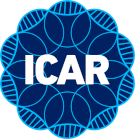User:Rstephansen/sandbox: Difference between revisions
Rstephansen (talk | contribs) No edit summary |
Rstephansen (talk | contribs) No edit summary |
||
| (6 intermediate revisions by the same user not shown) | |||
| Line 1: | Line 1: | ||
== | == Introduction Feed and Gas == | ||
Text about the group | |||
Link to Feed intake Guidelines | |||
Link to Methane Guidelines | |||
== | == Objectives of the Feed and Gas Working Group == | ||
The objectives of the Feed and Gas Working Groups are to: | |||
# Provide a forum for members of ICAR and associated researchers to collaborate, exchange information and learn from each other on all aspects of: recording and using dry matter intake data, and recording and using methane outputs data. | |||
# Maintain, update, promote and extend universal guidelines for recording dry matter intake and methane output in cattle, sheep and goats world-wide | |||
# Conduct and report the results of periodic international surveys on recording dry matter intake and methane output in cattle, sheep and goats worldwide. | |||
# Develop, provide and promote a system and standards for data storage and genetic evaluation services which will form the basis of services that ICAR will provide to members of ICAR and their research associates on a user pays basis. | |||
# Facilitate and cooordinate international collaboration in research and development on recording and using dry matter intake data, and recording and using methane outputs data. | |||
== Members of ICAR Feed and Gas Working Group == | |||
Below are the members of the Feed and Gas Working Group listen in alphabetic order, including a short description. | |||
{| class="wikitable" | {| class="wikitable" | ||
|+ | |+ | ||
! | !Researcher | ||
! | !Picture | ||
|- | |- | ||
| | | | ||
| Line 43: | Line 27: | ||
| | | | ||
| | | | ||
| | |- | ||
|Name: Rasmus Bak Stephansen | |||
Affiliation: Aarhus University, Center for Quantitative Genetics and Genomics | |||
E-mail: rasmus.stephansen@qgg.au.dk | |||
Homepage: https://pure.au.dk/portal/da/persons/rasmus.stephansen%40qgg.au.dk | |||
Research topic: | |||
My research is dedicated to enhancing phenotyping and modeling of feed efficiency in livestock, with a specific emphasis on lactating animals. The challenges posed by the early lactation dilemma are a central focus, driving our efforts to develop robust modeling approaches. Furthermore, my investigation extends to unraveling the genetic architecture linking feed efficiency to methane emissions, as well as its impact on animal functionality and welfare. Through these multifaceted inquiries, I aim to contribute to a more sustainable and welfare-oriented livestock industry. | |||
|[[File:Rasmus Skovgaard Stephansen.webp|thumb]] | |||
|} | |||
* | |||
* Name, affiliation, picture, homepage, research topic | |||
* | |||
* Christine Baes | |||
* Karoline Bakke | |||
* Lorenzo Benzoni | |||
* Raffaella Finocchiaro | |||
* Maria Frizzarin | |||
* Nina Krattenmacher | |||
* Jan Lassen | |||
* Jennie Pryce | |||
* Caeli Richardson (2023 Brian Wickham Young Persons Exchange Program Bursary) | |||
* Rasmus Bak Stephansen | |||
Latest revision as of 11:20, 12 February 2024
Introduction Feed and Gas
Text about the group
Link to Feed intake Guidelines
Link to Methane Guidelines
Objectives of the Feed and Gas Working Group
The objectives of the Feed and Gas Working Groups are to:
- Provide a forum for members of ICAR and associated researchers to collaborate, exchange information and learn from each other on all aspects of: recording and using dry matter intake data, and recording and using methane outputs data.
- Maintain, update, promote and extend universal guidelines for recording dry matter intake and methane output in cattle, sheep and goats world-wide
- Conduct and report the results of periodic international surveys on recording dry matter intake and methane output in cattle, sheep and goats worldwide.
- Develop, provide and promote a system and standards for data storage and genetic evaluation services which will form the basis of services that ICAR will provide to members of ICAR and their research associates on a user pays basis.
- Facilitate and cooordinate international collaboration in research and development on recording and using dry matter intake data, and recording and using methane outputs data.
Members of ICAR Feed and Gas Working Group
Below are the members of the Feed and Gas Working Group listen in alphabetic order, including a short description.
| Researcher | Picture |
|---|---|
| Name: Rasmus Bak Stephansen
Affiliation: Aarhus University, Center for Quantitative Genetics and Genomics E-mail: rasmus.stephansen@qgg.au.dk Homepage: https://pure.au.dk/portal/da/persons/rasmus.stephansen%40qgg.au.dk Research topic: My research is dedicated to enhancing phenotyping and modeling of feed efficiency in livestock, with a specific emphasis on lactating animals. The challenges posed by the early lactation dilemma are a central focus, driving our efforts to develop robust modeling approaches. Furthermore, my investigation extends to unraveling the genetic architecture linking feed efficiency to methane emissions, as well as its impact on animal functionality and welfare. Through these multifaceted inquiries, I aim to contribute to a more sustainable and welfare-oriented livestock industry. |
 |
- Name, affiliation, picture, homepage, research topic
- Christine Baes
- Karoline Bakke
- Lorenzo Benzoni
- Raffaella Finocchiaro
- Maria Frizzarin
- Nina Krattenmacher
- Jan Lassen
- Jennie Pryce
- Caeli Richardson (2023 Brian Wickham Young Persons Exchange Program Bursary)
- Rasmus Bak Stephansen
